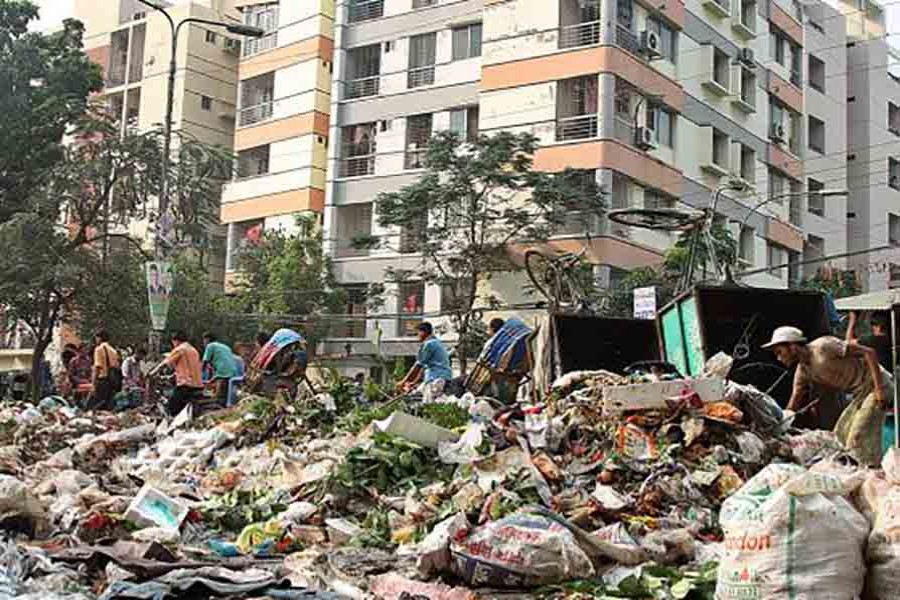At a two-day international conference on urbanisation held recently in the capital, a comprehensive review of city planning, investment in urban infrastructures, citizens' role and governance was made. Lead urban specialist at the World Bank (WB), Balakrishna Parameswaran opened his deliberation with the observation that in South Asia anti-urban policies prevail and prevail exacting real socio-economic costs. "Urbanisation's missed opportunity impacts poverty level," he laments. He then cites the example of Dhaka where unplanned urban sprawling and poor infrastructures have rendered it mostly dysfunctional.
Unsurprisingly, all the international surveys and studies have relegated the Bangladesh capital to the bottom segment of ranking. Be it in the liveability index, women-friendly list of metropolises and pollution of environment, Dhaka cuts a sorry figure wallowing abysmally at the lowest level. The WB expert argues that Dhaka has hit the bottom on most counts because required investment did not come by. He then criticises the system of city governance which, he feels, suffers from lack of institutionalisation.
This brings the argument to the point where local spending on urbanisation is merely 3.0 per cent of the total public expenditure -- one of the lowest in the world. However, the dichotomy here involves the channelling of major investment in Dhaka at the expense of other cities and municipalities. Then the issue of proper investment needs to be analysed. Apparently Dhaka's transportation lies at the heart of its chronic illness. The anarchy prevailing there is for all to see but the answer to the question why it cannot be brought into order appears to be more important.
A vicious nexus has gradually established its stranglehold on the system where the dubious largesse is shared among many powerful parties including those who are supposed to monitor and review the system for correction in the interest of public welfare. Instead, the unearned bounties do the trick of perpetuating disorder. Even the underworld gang leaders can lead an imperial life no matter if they are tactically imprisoned.
Few public services can be obtained in a normal way following the set procedures. Money -- and in some rare cases influence -- can buy almost every official document -- from driving licence to trade licence and many more. However, there is no guarantee that a trader -- whether a footpath vendor or a big businessman -- will be able to continue to operate business without parting with a chunk of profit as extortion money. The entire atmosphere in the capital has been vitiated where the honest and the innocent are marginalised.
In short, criminalisation of not only of certain offices or departments but of life in the city has its adverse impacts on its development. Dhaka city's erosion is not only taking place from the physical point of view but also from a moral standpoint. The irregularities and chaos can consolidate their hold on almost everything because the rule of law is sorely missing. Sure enough, the moral aberrations cannot be perceived by naked eyes but the lawlessness stamps its marks on almost every sphere of life.
When people in power are mostly busy advancing their stakes and interests at the cost of regulations and legal parameters, the spill-over spares no areas of administration and life. Even honest and serious people with unquestionable dedication to the land and its people are now cornered. In this situation, muscle power rather than intellect and merit does prosper. The corrupt influence sets the rot and its pervasiveness creates a moneyed class that now rules the roost.
The physical problem is not isolated from the diseased mind. There is need for addressing the mind gone haywire on account of avarice and selfish considerations. Love for the land and its people is the ultimate remedy. Dhaka city's unplanned development owes partly to lack of vision but mostly to various quarters' collaboration to systematically destroy its physical advantages. The water bodies, canals and retention areas of low lands have all been either filled or choked up. Even the rivers around the city have been allowed to receive so much garbage and industrial effluent they could not cope with. Today they exist in the form of their skeletons and their water is much too contaminated to harbour living organisms in them. Realtors surprisingly argue that Dhaka needs no water retention areas.
Mob mentality of many of the agencies, associations and trade unions has been encouraged officially so that law cannot take its own course. It is because of this transport workers feel no qualms about going on a wildcat strike to save one of their co-workers found guilty by the court. The arm-twisting tactic works in most cases. Some drives are launched against footpath encroachers or illegal construction at times but these are mere eyewash signifying nothing substantial. If respect for law cannot be ensured, it will be impossible to cure the diseases the city or by extension Bangladesh society is suffering from. Investment in infrastructure also warrants a responsible role right from the planning to the execution. Has any of the projects, particularly the large ones been completed on schedule and without spiralling the cost overrun? This tells the story. If there is any paradigm shift, it has to be in the mentality of the people.


